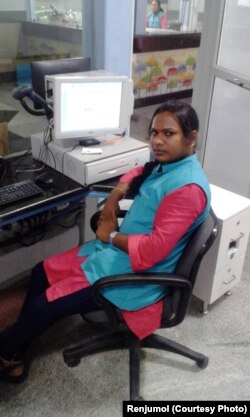As 28-year-old Renjumol punches tickets for customers at the newly inaugurated metro in the southern Indian city of Kochi, he cannot believe the complete turn life has taken.
"Happy, very happy,” says the transgender person, who like others in the community, has had to beg, sing and dance at weddings to scrape together a living.
Renjumol is one of 23 transgender people who have landed a job at Kochi Metro Rail as part of a groundbreaking initiative by the government-owned company to integrate a community that has long suffered discrimination and survived at the margins of society.
It is the first government agency in India to open its doors to transgenders since a landmark 2014 Supreme Court ruling that recognized the country’s two million transgenders as the third gender. But although the court ordered that they should be eligible for job and education quotas like other minorities, little has changed on the ground for the ostracized community in the last three years.
That is why campaigners for trans rights hope that the Kochi metro action will show the way to others in the country. Kochi is a port city in Kerala on India’s southern tip – a palm-lined state with India’s highest literacy rate.
The 23 transgenders work in ticketing, customer care and housekeeping – giving them an opportunity to come face to face with the thousands who ride on the metro.
“Common people like you and I will also get a chance to interact with these people and that will facilitate an understanding that there is nothing fundamentally different between we people and the transgenders,” says Dilraj KR, project manager at Kudumbashree, an organization focused on poverty eradication and women’s empowerment in Kerala that helped train the transgenders for the metro jobs. “They are also human beings like everybody else.”
The effort to secure jobs for the transgender community was born after a group landed in a police station following a brawl and explained to a sympathetic police commissioner that they would not be involved in illegal activities such as sex work or begging on trains and at traffic signals if they had “respectful jobs” to earn a living.
Talks that ensued with the Kochi Metro and Kudumbashree finally led to an endeavor that resulted in the job offers to the 23 transgenders. More are likely to follow.
A handful of transgenders in recent years have broken stereotypes – one has established a modelling agency, a group of six has made a music album for Bollywood and one became a police officer in Tamil Nadu last month after a long legal battle.
But most continue to be stigmatized and the few that have managed to get jobs in private companies with the help of voluntary groups do not find the going easy. The main problem: prejudice, ridicule and a society where changing mindsets continues to be a herculean challenge.
In the southern city of Bengaluru, the Solidarity Foundation that champions the cause of transgender people, has placed about a dozen with private companies over the last three years.
Pointing to the myriad challenges that come up at the workplace, the group’s director, Shubha Chacko says, “For instance women go out for lunch together and men go out and sit somewhere else and the trans person does not know where she is supposed to go.”
The larger group placed at Kochi Metro will not only make it easier to overcome such challenges, but also send out a message to potential employers. “That means the signal is coming out from the government that others can do it. Otherwise there are people who are always feeling – is it OK, is it not OK? So the norm starts to change,” says Chacko.
Signs of such a change are already there in Kochi. Dilraj, an MBA from the prestigious Indian Institute of Management at Kozhikode says that after the Kochi Metro initiative, some people have already expressed their willingness to hire transgender people if the experiment goes well. He admits there will be challenges ahead, but is optimistic about spearheading change. “Once it is successful, we will flag it to many people. I know it will not happen in one day, but every big journey has to start with a small step. We have taken that step.”
It may represent a small step from the perspective of the two million transgender people waiting for social integration, but for Renjumol perched behind the ticket counter, it is a giant leap.
For the past week as he sat behind the ticket counter, he has experienced a sense of security he never had when he says he had to “face discrimination in every field.” Determined to make a success of the new path he has embarked upon, Renjumol explains haltingly, “I changed my life now. My aim is I will have safe life.”





